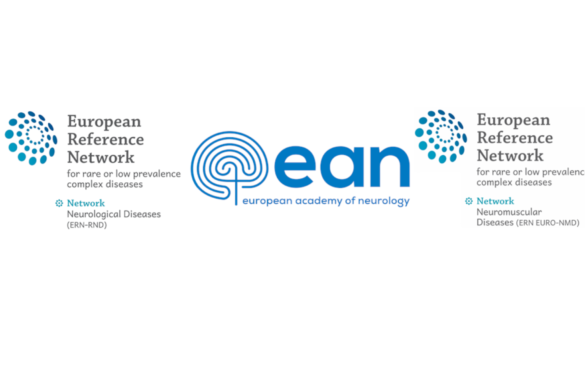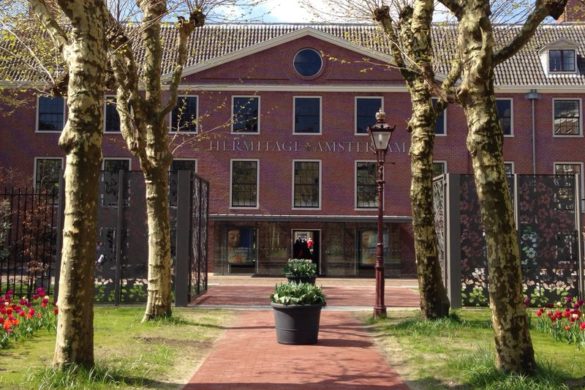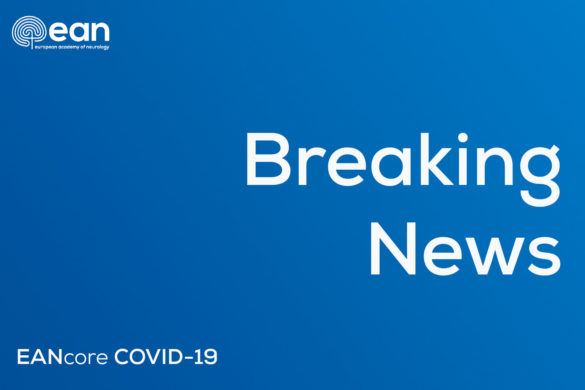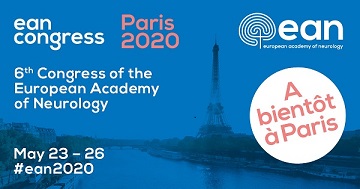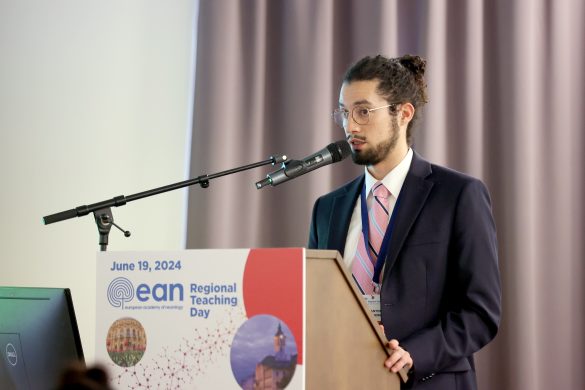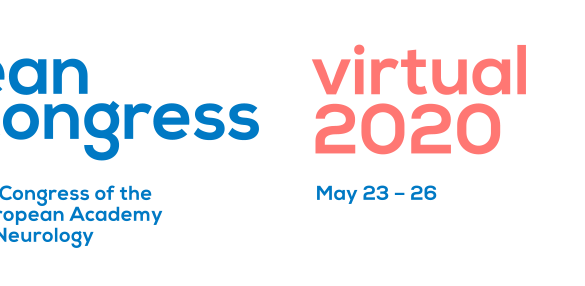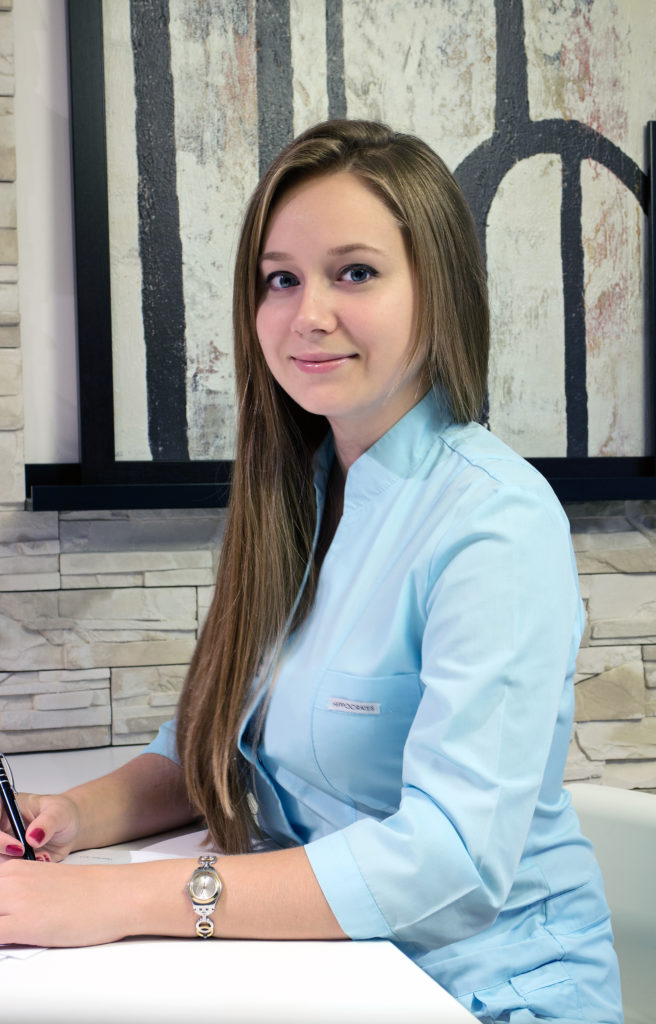
Name: Iuliia Travkina, Slovakia
Term of the Fellowship: 15.4.-27.5.2019
Hosting department: Evangelical Hospital Unna, Unna, Germany
Supervisor: Prof. Zaza Katsarava
First of all, I would like to emphasise the fact that the educational programme that I
performed within the Department of Neurology at Evangelical Hospital Unna was a useful and productive experience for me, which will be very beneficial in my future professional activity.
During my visit, I took part in various clinical activities. I was present in department of Neurology, where I daily assisted the morning visits, together with the doctors from the department, I attended different performed investigations, and I was also present during the visits performed together with Professor Katsarava and other experienced neurologists.
I also assisted the hospitalisation procedure of the patients. I looked at Emergency Department organisation and acute care at Stroke-Unit. At the neurophysiological laboratory I got to know more about evoked potentials investigating and electromyography. I acknowledged the treatment schemes of different diseases, like Parkinson disease, multiple sclerosis, stroke, headache, etc. I took part in ambulatory visits of patients with different types of headache, like medicine abuse headache, Cluster headache, etc, and their treatments (including botulinum toxin therapy and the calcitonin gene-related peptide receptor therapy in chronic migraine – erenumab) with Professor Katsarava.
I got acquainted with different doctors within the hospital, with whom I hope that I will keep in touch and will collaborate in the future. According to the gained experience and the acquired skills, I would like to emphasize the fact that the educational programme performed within the Department of Neurology of Evangelical Hospital Unna was an efficient, practical and accomplished one. In my opinion, I gained an important experience during this period of time and that is why I am extremely grateful to Professor Zaza Katsarava, who accepted me within the department. I am very grateful to the EAN Clinical Fellowship and I think that this kind of educational programme is very useful and welcomed, especially for all the young neurologists.
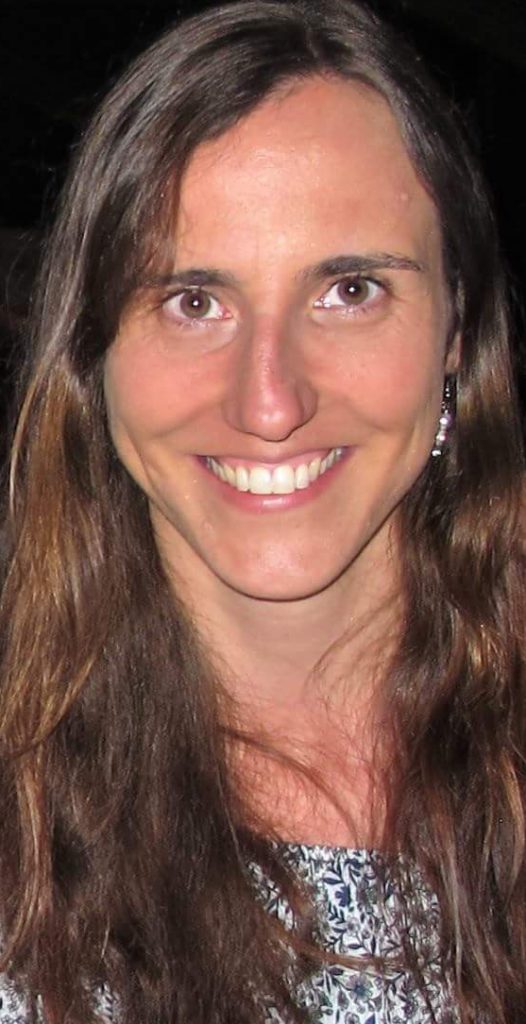
Name: Monika Turk, Slovenia
Term of the Fellowship: 7.1. – 20.3.2019
Hosting department: Department of Neurology, Atkinson Morley Wing. St George´s Hospital, London, United Kingdom
Supervisor: Prof. Nicholas J. Gutowski
It was given the opportunity to enrich my clinical experience in cognitive and movement disorders at St George´s Hospital in London, under supervision of Dr. Jeremy Isaacs. During my almost 3 months visit, I had a chance to work with many experts in cognitive and movement disorders fields as well as in some other fields, participate in the clinical routine on the ward and in outpatient clinics, as well as to join Dr. Isaacs few times at his general neurology clinics in other hospitals. I was also able to attend regional neurologist’s meetings for multiple sclerosis and dementia. However, most of the time I had practice in outpatients’ clinics and my weekly program was mostly as follows:
- On Mondays I attended Movement Disorder Clinic with Dr. Dominic Paviour or joining Dr. Isaacs in General Neurology Clinic in Kingston hospital.
- On Tuesdays I attended Movement Disorder Clinic with Dr. Francesca Morgante or Functional Neurological Disorders Clinic with Prof. Mark Edwards.
- On Wednesdays morning I attended Movement Disorder Clinics with Dr. Dominic Paviour or Dr. Francesca Morgante, in the afternoon I joined Dr. Morgante at Botox Clinic.
- On Thursdays and Fridays I joined the Cognitive Neurology (Dementia) Clinics with Dr. Isaacs or Prof. Peter Garrard.
- On Fridays’ morning, I attended the Radiology meetings where specific patients were reviewed and discussed regarding imaging investigations. After that some interesting clinical cases were presented by neurologist residents, followed by a review about certain neurology field. Then I attended lectures in The John Parker Lecture Theatre, where a great variety of neurological issues were discussed by different specialists in the Department.
At the Cognitive Neurology Clinic, I could observe different clinical approach perspectives on the Cognitive Impairment and Dementia, particularly in young patients. I had a chance to see patients with rare problems that are rarely seen in our clinic, which allowed me to learn and master the most important points of the differential diagnosis. I also had opportunity to observe patients recruitment for some new Alzheimer’s drug clinical trial and participated in some ongoing trial protocols. To my surprise, I noticed that the neurologist of this clinic tend to rely more on clinical aspects of diagnosis and less in complementary investigations, requesting the most complex tests primarily when these will modify the patient or the family prognosis. I was amazed how detailed and focused was an assessment with each patient and his family with enough time to answer all their questions and manage their individual needs and how all of them gained very positive view on their conditions. Furthermore, I was exited how good multidisciplinary team approach worked to satisfy patients and caregivers needs; how well doctors, nurses, psychologists, physiotherapists, occupational therapists, social workers, different patient support groups and communities collaborated together on creating a strong healthcare and social support for each patient. I am now more optimistic with this experience and knowledge about how much more can be done for dementia patients and hope to be able to help in improvement of care for those patients in my hospital.
At the Movement Disorders Clinics, I was able to observe management of different stages of Parkinson disease (PD), atypical parkinsonian syndromes, tremor, ataxia and dystonia patients, early onset and inherited parkinsonian syndromes and some other rare movement disorders. I learned to establish a wider differential diagnosis for these disorders and I improved my skills in recognising rare signs and symptoms and to perform an advanced examination on these. I also attended botulinum toxin clinics for patients with tremor and focal dystonia, where I could observe injections. One of the great benefits was the opportunity to observe the cooperation of multidisciplinary team in management of Parkinson’s Disease patients. They were offered complex care of Parkinson’s Disease nurse, pharmacologist, occupational therapy service, speech therapy and physiotherapy. My special interest was advanced treatment technique. The Hospital is a reference centre for a Deep Brain Stimulation (DBS) in Parkinson Disease (PD), Dystonia and Tremor, besides that they perform some other techniques (such as Thalamotomy, Apomorphine or Duodopa pumps…) in patients with PD that don’t fit in the DBS profile. I had the chance to see patients referred tothese kinds of treatments, learning pre-assessment, inclusion and exclusion criteria, dose managements and most prevalent side effects. I was surprised how early in patients progression and how easily they can decide for DBS, since in my hospital, we can only provide this technique to few very selective patients due to rare availability of these procedures. Since I am optimistic that these treatments availability will improve at my clinic, I hope to be able to use the gained knowledge then.
The Functional Neurological Disorders Clinic was completely new to me since at my hospital we don’t have anything like that. I experienced the approach, diagnosis and management of those patients for the first time. I got new insight into these disorders which has completely changed my perspective on these disorders. I was amazed that with correct approach these patients know, understand and accept their condition which then allows them to improve. I was also inspired by multidisciplinary approach management of these patients (Neurology, Psychiatry, Nurses, Physiotherapy and Psychology) during which trough different programmes, designed individually, these patients have improved or completely recovered. I hope to be able to inspire my colleagues in my hospital to develop something like that.
During my whole stay I was astonished by the UK health care system which, in contrast to my country, with the existence of clinical and community nurses, the local community group services, the disease program services and good access of everybody to these services enable patients and its caregivers quality care and support. I have realised that there is a lot of things we can do better in Slovenia inspired by this English model to improve the care of our neurological patients and I think this is the most important take-home message from this fellowship. In summary, this clinical fellowship was one of the best experiences of my personal and professional life and am very grateful to European Academy of Neurology for giving me that amazing opportunity. I consider that this fellowship was extremely beneficial, mainly due to the access to highly committed and specialised professionals from different areas, with remarkable clinical experience and with multidisciplinary nature of the work. I am sure that this fellowship expanded my clinical knowledge and will help me to shape my future as a neurologist. I would like to thank all personnel of the neurology department at St. George for having me during this clinical fellowship, specially to my supervisor Dr. Jeremy Isaacs, and would highly recommend this department to the future candidates of this exchange program.




